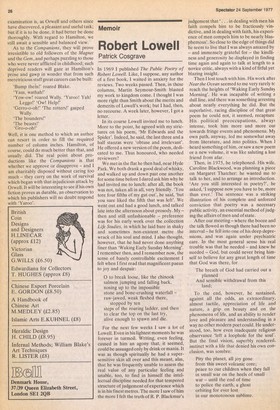Memoir
Robert Lowell
Patrick Cosgrave
In 1969 I published The Public Poetry of Robert Lowell. Like, I suppose, any author of a first book, I waited in anxiety for the reviews. Two weeks passed. Then, in these columns, Martin Seymour-Smith blasted my work to kingdom come. I thought I was more right than Smith about the merits and demerits of Lowell's work; but I had, then, no recourse. A week later, however, I got a letter.
In its course Lowell invited me to lunch. More to the point, he agreed with my strictures on his poem, 'Mr Edwards and the Spider'. Indeed, he said, the last three and a half stanzas were 'obtuse and irrelevant'. He offered a new version of the poem, dedicated to me. Thus honoured, who needed reviewers?
We met in the flat he then had, near Hyde Park. We both drank a good deal of whisky, and walked up and down past one another for some time before I dared ask him why he had invited me to lunch: after all, the book was not, taken all in all, very friendly. 'You tore four fifths of my gut out', he said, 'but you sure liked the fifth that was left'. We went out and had a good lunch, and talked late into the afternoon about prosody. My — then and still unfashionable — preference was for his early work over the collection Life Studies, in which he laid bare in shaky and sometimes non-existent metre the wrack of his soul and mind. 1 also thought, however, that he had never done anything finer than 'Waking Early Sunday Morning'. I remember then, and I remember now, the sense of barely controllable excitement I felt when I first read that magnificent paean to joy and despair: 0 to break loose, like the chinook salmon jumping and falling back, nosing up to the impossible stone and bone-crushing waterfall — raw-jawed, weak fleshed there, stopped by ten steps of the roaring ladder, and then to clear the top on the last try, alive enough to spawn and die.
For the next few weeks 1 saw a lot of Lowell. Even in his lightest moments he was forever in turmoil. Writing, even feeling, caused in him an agony that, it seemed, could be assuaged only by drink or mania. It was as though spiritually he had a supersensitive skin all over and this meant, alas, that he was frequently unable to assess the real value of any particular feeling and unable, too, to find in himself the intellectual discipline needed for that tempered structure of judgement of experience which is in his finest metres. The more I saw of him the more I felt the truth of R. P. Blackmur's judgement that ' . . . in dealing with men his faith compels him to be fractiously vindictive, and in dealing with faith, his experience of men compels him to be nearly blasphemous'. So close to the edge of things did he seem to live that I was always amazed by — and immensely grateful for — the kindliness and generosity he displayed in finding time again and again to talk at length to a novice critic, always with a kind of fitful yet blazing insight.
Then I lost touch with him. His work aftet Near the Ocean seemed to me very rarely tc reach the heights of 'Waking Early Sunday Morning'. He was incapable of writing a dull line, and there was something arresting about nearly everything he did. But the superlative, racing discipline of that great poem he could not, it seemed, recapture. His political preoccupations, always intense, took him more and more out towards fringe events and phenomena. My own path, anyway, led me somewhat away from literature, and into politics. When I heard something of him, or saw a new poem or a new volume, it was like saluting a lost friend from afar.
Then, in 1975, he telephoned. His wife, Caroline Blackwood, was planning a piece on Margaret Thatcher: he wanted me to talk to her, and to arrange an introduction. 'Are you still interested in poetry?', he asked, 'I suppose now you have to be, more than ever.' The sentence was a striking illustration of his complete and unforced conviction that poetry was a necessary public activity, an essential method of judging the affairs of men and of state.
After our meeting — where the booze and the talk flowed as though there had been no interval — he fell into one of his deep depressions, and was again under psychiatric care. In the most general sense his real trouble was that he needed — and knew he needed — God, but could never bring himself to believe for any great length of time that God was there, for The breath of God had carried out a planned And sensible withdrawal from this land; To the end, however, he sustained, against all the odds, an extraordinary, almost tactile, appreciation of life and nature, a grip on beauty and on the phenomena of life, and an ability to render love and pleasure and understanding in a way no other modern poet could. He understood, too, how even inadequate religious observance 'left a loophole for the soul'. But the final vision, superbly rendered, instinct with a life that denied his own conclusion, was sombre: Pity the planet, all joy gone from this sweet volcanic core; peace to our children when they fall in small war on the heels of small war — until the end of time to police the earth, a ghost orbiting for ever lost in our monotonous sublime.


































 Previous page
Previous page